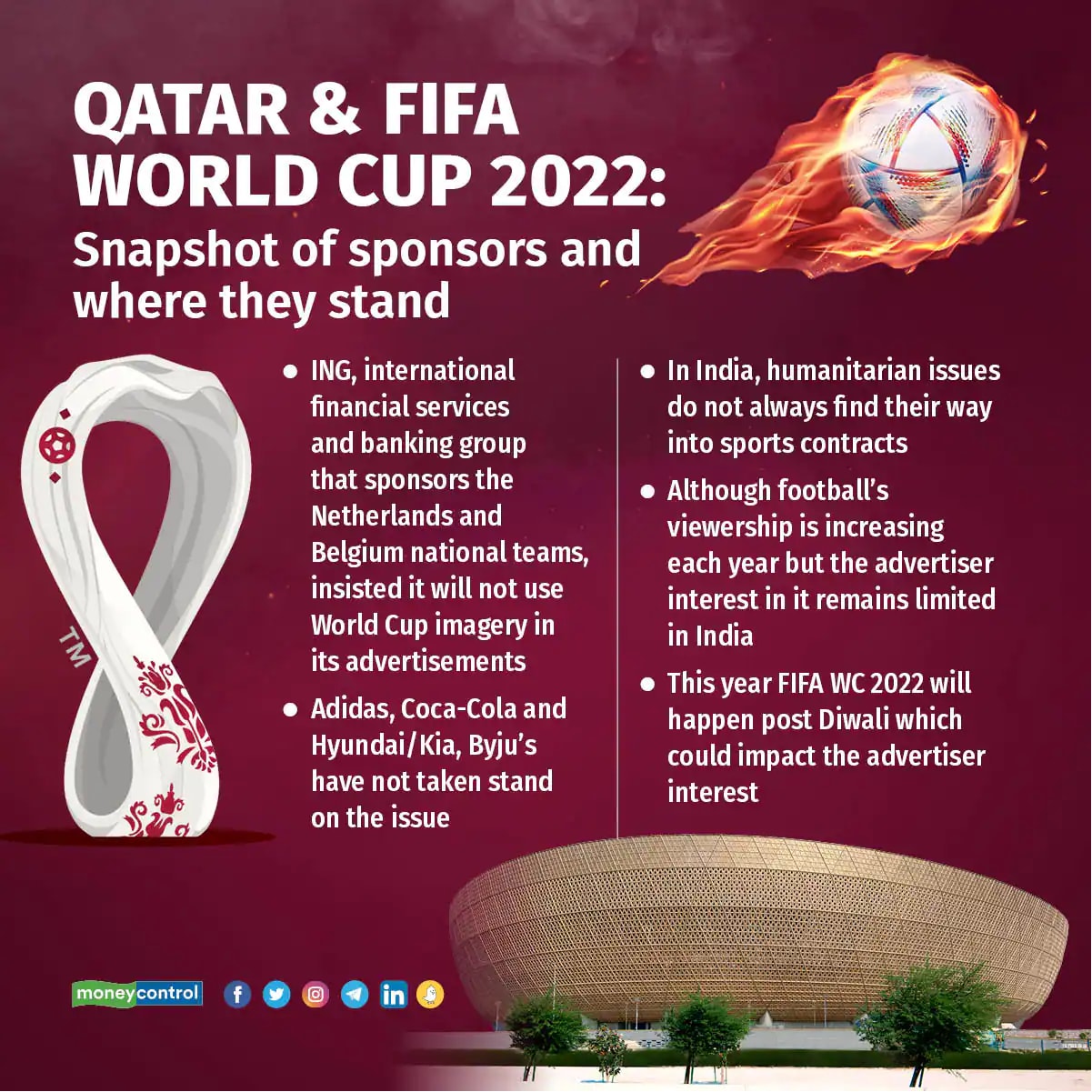Will Qatar’s humanitarian crisis impact FIFA World Cup sponsorship?
While globally FIFA might have to face soft boycott from a section of brands, in India there might not be much pushback as a select few brands associate themselves with the tournament.
ADVERTISEMENT
As Qatar prepares to host the 2022 FIFA World Cup scheduled between 21 November and 18 December, a section of brands has chosen to stay away from the big sports tournament troubled by worker abuse and human rights issues prevailing in the host nation.
For instance, ING, an international financial services and banking group that sponsors the Netherlands and Belgium national teams, insisted it will not use World Cup imagery in its advertisements and it will not send representatives to Qatar. Several other partners of the Dutch and Belgian teams also issued statements outlining their plans to ignore what would in normal circumstances be a major marketing platform.
To be sure, brands such as Adidas, Coca-Cola and Hyundai/Kia are global partners with FIFA. Meanwhile, edtech major Byju’s also joined the big league by announcing FIFA sponsorship in March. However, none of these brands have openly taken a stand on the humanitarian crisis at Qatar.
Byju’s declined to comment on the issue.
Sports marketing and advertising executives believe that while globally FIFA might have to face soft boycott from a section of brands, in India there might not be much pushback as a select few brands associate themselves with the tournament.

Qatar & FIFA World Cup 2022
Limited brands associations
“I’m not aware of any Indian brands backing out because of humanitarian concerns from any global sports properties so far. There haven’t been too many Indian brands in the first place that have been associated with global properties. It’s happening now with firms like Byju’s and a couple of others around the World Cup,” says a senior sports marketing executive requesting anonymity.
The executive emphasises that the boycott, if it happens, will be mostly done by international firms.
“I don’t see that happening around the FIFA World Cup primarily because it’s such a big property. In terms of humanitarian grounds, most brands would look at pressing and time bound issues such as a war, climate change which are constantly in the news. The Qatar humanitarian issue is an ongoing crisis so it is a lot more difficult to take a stand. Scandinavia human rights is treated as a big issue hence brands there taking a stand is no surprise,” the executive adds.
Legally not binding
In India, humanitarian issues do not always find their way into sports contracts, says Mathew Chacko, Partner, Spice Route Legal.
“However, it is merely a matter of time before Indian corporations that sponsor sports events start using their leverage to require organizers to contribute to the betterment of work / living / environmental standards,” he adds.
“In terms of sports contracts, there are no grounds to back out from a sponsorship; they can choose not to be a part of the event but they will have to pay the fee. We saw brands doing that during the Winter Games in China,” notes sports marketing executive quoted above.
Limited local advertiser interest
Undoubtedly, the FIFA World Cup is a massive sports property in terms of sponsorship and viewership. For instance, the last edition of the World Cup held in Russia garnered over 3.5 billion viewers. However, in cricket obsessed nations like India there’s limited interest in the tournament garnering viewers from selected markets.
As per BARC India’s data, FIFA World Cup 2018 managed to get a total of 111 million unique viewers and 231 million impressions. The viewership was high particularly in the regional centres. Kerala, Assam, North-east, Sikkim and West Bengal together contributed to 81 per cent of the total viewership for FIFA World Cup 2018.
This is in sharp contrast to IPL 2018 viewership where Star Sports Network with 17 channels managed to get 448 million unique viewers, the impressions of which comes up to 1.4 billion.
Although football’s viewership is increasing each year but the advertiser interest in it remains limited and this year the tournament will happen post Diwali so the interest will be impacted, says Dinesh Singh Rathore, CEO, Madison Omega.
“There is limited inventory to sell in FIFA matches (during mid-break, pre-break and post the match). Unlike cricket and tennis, there’s no live inventory to be sold. Thankfully, it is being held in Qatar so matches will be suitable for Indian audiences however there are only a set of brands that associate with football. Some of them are sponsors with FIFA and have a long standing association with leagues across Europe and they will continue to capitalise on it,” he concludes.
While FIFA might face pushback in terms of soft boycott by global firms, the ripple effect, it seems, is unlikely to be felt in India where football advertising is yet to reach a massive scale.

